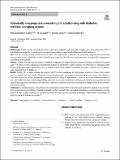Potentially inappropriate prescribing for adults living with diabetes mellitus : a scoping review
Abstract
Background People living with diabetes often experience multiple morbidity and polypharmacy, increasing their risk of potentially inappropriate prescribing. Inappropriate prescribing is associated with poorer health outcomes. Aim The aim of this scoping review was to explore and map studies conducted on potentially inappropriate prescribing among adults living with diabetes and to identify gaps regarding identification and assessment of potentially inappropriate prescribing in this group. Method Studies that reported any type of potentially inappropriate prescribing were included. Studies conducted on people aged < 18 years or with a diagnosis of gestational diabetes or prediabetes were excluded. No restrictions to language, study design, publication status, geographic area, or clinical setting were applied in selecting the studies. Articles were systematically searched from 11 databases. Results Of the 190 included studies, the majority (63.7%) were conducted in high-income countries. None of the studies used an explicit tool specifically designed to identify potentially inappropriate prescribing among people with diabetes. The most frequently studied potentially inappropriate prescribing in high-income countries was contraindication while in low- and middle-income countries prescribing omission was the most common. Software and websites were mostly used for identifying drug-drug interactions. The specific events and conditions that were considered as inappropriate were inconsistent across studies. Conclusion Contraindications, prescribing omissions and dosing problems were the most commonly studied types of potentially inappropriate prescribing. Prescribers should carefully consider the individual prescribing recommendations of medications. Future studies focusing on the development of explicit tools to identify potentially inappropriate prescribing for adults living with diabetes are needed.
Citation
Ayalew , M B , Spark , M J , Quirk , F H & Dieberg , G 2022 , ' Potentially inappropriate prescribing for adults living with diabetes mellitus : a scoping review ' , International Journal of Clinical Pharmacy , vol. First Online . https://doi.org/10.1007/s11096-022-01414-7
Publication
International Journal of Clinical Pharmacy
Status
Peer reviewed
ISSN
2210-7703Type
Journal item
Description
Funding: Mohammed Biset Ayalew is the recipient of a University of New England International Postgraduate Research Award (UNE IPRA) scholarship to support his PhD research. This study was partially funded by the UNE School of Rural Medicine Higher Degree Research allocation.Collections
Items in the St Andrews Research Repository are protected by copyright, with all rights reserved, unless otherwise indicated.

